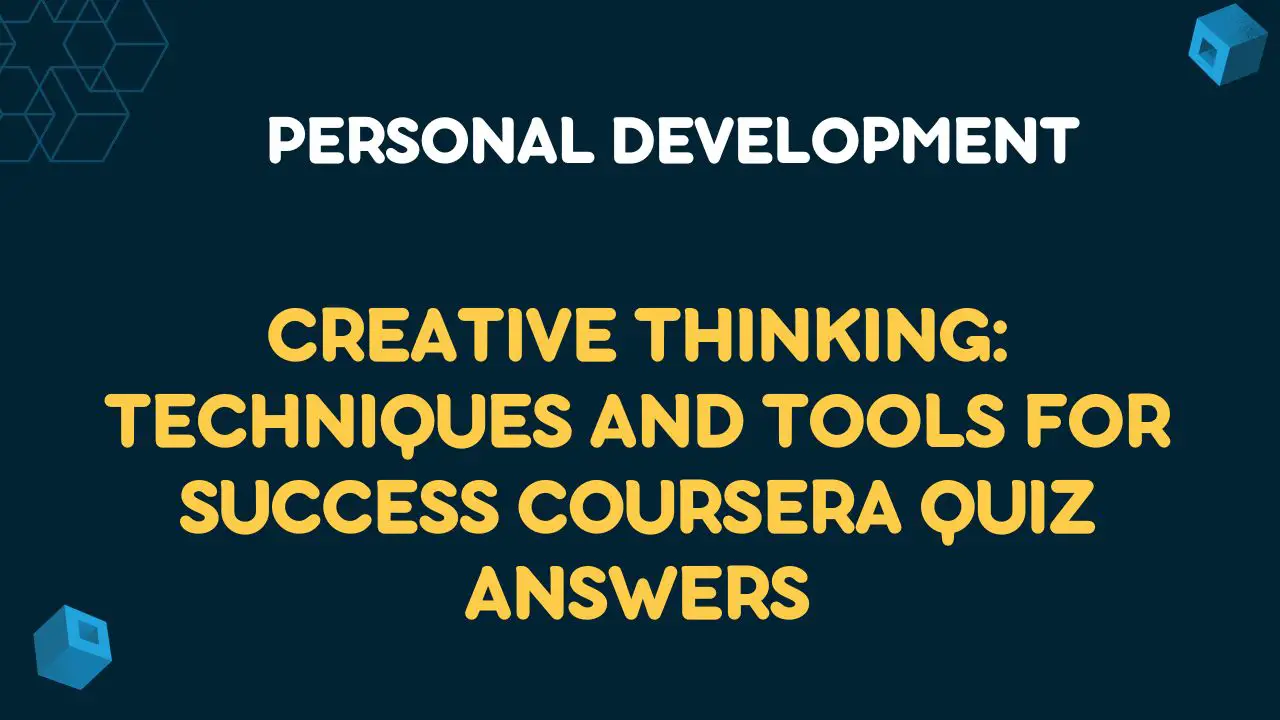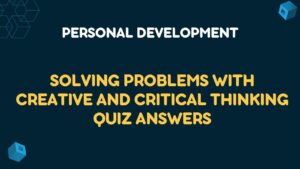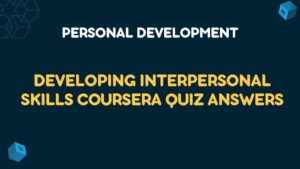Table of Contents
Get All Weeks Creative Thinking: Techniques and Tools for Success Coursera Quiz Answers
Week 02: Creative Thinking: Techniques and Tools for Success Coursera Quiz Answers
Quiz 1: Knowledge Check: Creativity Tools
Q1. Select three types of brainstorming techniques.
2.Design Thinking
3.Brainwriting
Q2. In this course, what does c and C stand for?
ViewQ3. In this course, what does P and H stand for?
ViewQ4. In brainstorming criticism is
ViewQ5. What is the biggest barrier to being creative?
ViewQ6. Stressful environments:
ViewQ7. In this course: if necessity is the mother of invention, then who is the “father”?
ViewQ8. Is the statement true or false?
ViewThere is one universal definition for creativity.
Q9. Is the statement true or false?
Creativity exists on a single level.
ViewQ10. Is the statement true or false?
Creativity is only used by artists and designers.
ViewQ11. Is the statement true or false?
Creativity cannot be taught.
ViewQuiz 2: Knowledge Check: Grid Brainstorming
Q1. Complete the sentence:
Grid brainstorming enables all participants to contribute ideas…
ViewQ2. Complete the sentence with the best answer:
You pass on the grid when…
ViewQ3. Complete the sentence:
The solutions can be portrayed using…
ViewQ4. Complete the sentence:
When completing a new row the aim is to…
ViewQ5. Is the statement true or false?
In grid brainstorming, only the facilitator sketches the ideas on the grid.
ViewQ6. Is the statement true or false?
In grid brainstorming, you must use a 3×3 grid.
ViewWeek 03: Creative Thinking: Techniques and Tools for Success Coursera Quiz Answers
Quiz 1: Taking an Evidence-Based Approach
Q1. Select whether the following statement is objective or subjective:
When I think about the last two decades, they must have been the hottest the world has seen for several millennia.
ViewQ2. Select whether the following statement is objective or subjective:
Between 1990 and 2014 there has been an increase in U.S emissions by a total of 7.7%.
ViewQ3. Select whether the following statement is objective or subjective:
According to NASA data, Greenland ice sheets have decreased in mass showing a loss of 150 to 250 cubic kilometers (36 to 60 cubic miles) of ice per year between 2002 and 2006.
ViewQ4. Select whether the following statement is objective or subjective:
According to my sister extreme weather events are going to occur every day in the future.
ViewQuiz 2: Knowledge Check: Thinking Styles
Q1. Reviewing the way successful people think suggests that there is a single dominant way of thinking that leads to success
ViewQ2. Divergent thinking involves the consideration of a diverse range of ideas and the selection of a preferred concept to take forward for further work
ViewQ3. Inductive reasoning involves the verification of a new or emergent theory by testing it against different scenarios.
ViewQ4. Psychologists consider that some types of thinking can be unhelpful
ViewQ5. The following statement is an example of evidence that could be used in an evidence-based approach: ‘There’s more CO2 in the atmosphere than at any point in the Earth’s history
ViewQ6. The following statement is an example of evidence that could be used in an evidence-based approach: ‘120,000 square kilometers of tropical forest were lost in 2018’
ViewQ7. Analytical thinking involves breaking down a challenge or information into its constituent parts.
ViewQ8. Iteration and revisiting previous considerations are typical in design thinking
ViewQ9. A key aspect of critical thinking is exploring the evidence that supports a view or otherwise
ViewWeek 04: Creative Thinking: Techniques and Tools for Success Coursera Quiz Answers
Quiz 1: Knowledge Check: Morphological Analysis
Q1. Morphological Analysis is…
ViewQ2. Which of the following statements about Morphological Analysis isn’t true?
ViewQ3. Morphological Analysis…
ViewQ4. Select all boxes that apply.
Select the fields where Morphological Analysis can be applied.
View2.Business
3.Design
4.Product
Q5. Select all boxes that apply.
Which of the following components does a morphological chart include?
View2.Description in text or sketches
Q6. Which one of the sub-systems below is irrelevant to the design of a pallet-moving device?
ViewQ7. Which one of the sub-systems below is mostly relevant to the design of an image recording device?
ViewQ8. Select all boxes that apply.
What are the advantages of Morphological Analysis?
View2.The method illustrates the relationship between the components of the system to the system itself.
Q9. Which one of the following procedures is not part of Morphological Analysis?
ViewQ10. Morphological Analysis is a great way to augment our creative thinking because…
ViewQ11. In Morphological Analysis, it is __ that connects connections between the sub-systems.
ViewQ12. The sub-functions and potential means of fulfilling each of these sub-functions can be arranged in a _.
ViewQ13. The grid of a morphological chart can be populated by __ depicting the potential means of fulfilling the sub-system requirement.
ViewWeek 05: Creative Thinking: Techniques and Tools for Success Coursera Quiz Answers
Quiz 1: Knowledge Check: TRIZ Principles and Parameters
Q1. If extra seats are added to an airplane, which parameter worsens?
ViewQ2. Contactless payment cards have used the principle of Extraction by removing the need for chip and pin. What parameter does this improve?
ViewQ3. Which principle do Venetian window blinds use to enable them to open and close?
ViewQ4. Which principle does a telescope use to reduce the volume for storage and transport?
ViewQ5. Which principle do helium or hot-air blimps use for advertising?
ViewQ6. Which principle does a treadmill use to keep the runner stationary?
ViewQ7. Which principle do recyclable paper cups use in place of ceramic crockery in cafes in order to avoid the cost of cleaning and storing durable objects?
ViewQ8. Which principle do warning lights, such as traffic lights, use?
ViewQ9. Which principle does a flashing bicycle warning lamp use to be more noticeable and use less power?
ViewQ10. Which principle does the conversion of methane emitted from decomposing rubbish use to turn it into useful power?
ViewQ11. Select two parameters that IKEA has improved to enable DIY furniture assembly.
View2.Device complexity
Q12. Select two parameters that IKEA has compromised or worsened to enable DIY furniture assembly.
View2.Stability of the object’s composition
Quiz 2: Application of TRIZ – 1
Q1. Now it is your turn to use the contradiction matrix!
Look at our list of 39 parameters, choose an improving parameter and worsening for heating and air-conditioning of electric vehicles, and give a reason for your suggestion.
Choose an improving parameter for heating and air-conditioning of electric vehicles.
Just type the number of the parameter.
ViewQ2. Give a reason for the selection of your improving parameter in Question 1.
What do you think? Your answer cannot be more than 10000 characters.
ViewQ3. Choose a worsening parameter for heating and air-conditioning of electric vehicles.
Just type the number of the parameter.
ViewQ4. Give a reason for the selection of your worsening parameter in Question 3.
What do you think? Your answer cannot be more than 10000 characters.
ViewQuiz 3: Application of TRIZ – 2
Q1. Now here’s another exercise for you to practice TRIZ.
A classic contradiction exists in the messaging given to teenagers and young adults in some sectors of society and that given or perceived by women in their thirties. We tend to encourage young teenagers and adults not to have unplanned pregnancies.
There are multiple reasons put forward for this, many quite justifiable in the modern context. A dramatic switch is sometimes perceived by women in their thirties, associated with egg fertility rates, where there can be strong pressure, be it from society, peers, or self, to become pregnant.
This perceived contradiction: ‘Don’t get pregnant’ and ‘have a child before it’s too late’ may be amenable to suggestions from the TRIZ creativity tool.
You’ll need to:
- Explore the contradiction
- Look at our list of 39 parameters and identify possible improving and worsening parameters for this contradiction.
- Type the number of the parameter in the below box and give reason(s) for the selection of your parameters. e.g. [5] – Reliability
What do you think? Your answer cannot be more than 10000 characters.
ViewReason: The improving parameter could be related to the speed of achieving the desired outcome, which is having a child. In the case of teenagers and young adults, the improvement would mean delaying pregnancy until they are ready to provide a stable environment for a child. For women in their thirties, the improvement would mean increasing the speed of conceiving if they desire to have children due to the potential decline in fertility with age.
2.Worsening Parameter: Parameter 6: Energy Efficiency
Reason: The worsening parameter could be associated with the energy or effort required to achieve the desired outcome. For teenagers and young adults, worsening energy efficiency would mean making the process of having a child more difficult or energy-consuming, discouraging unplanned pregnancies. For women in their thirties, worsening energy efficiency would imply that the process of conceiving becomes more challenging and energy-draining, highlighting the potential difficulties associated with delayed motherhood.
rameter: 6 (Energy Efficiency)
ViewSuggested Inventive Principle: 31 – Porous Materials
Reason: The suggested inventive principle, “Porous Materials,” implies introducing intermediary steps or barriers in the process. In the context of the contradiction, it could mean creating a structured path for young adults and teenagers to delay pregnancies until they are ready (improved speed) while making the process of conceiving more challenging or complex for women in their thirties (worsened energy efficiency). This principle aims to strike a balance between the two contradictory messages by introducing controlled barriers and pathways to parenthood based on individual circumstances and readiness.
Week 06: Creative Thinking: Techniques and Tools for Success Coursera Quiz Answers
Quiz 1: Knowledge Check: SCAMPER
Q1. What does the S in SCAMPER stand for?
ViewQ2. Which letter does the provocation “What can be mixed?” refer to?
ViewQ3. What does the A in SCAMPER stand for?
ViewQ4. What does the letter M in SCAMPER stands for?
Hint – Can the shape and/or form be changed?
ViewQ5.What does the letter R in SCAMPER stands for?
Hint – What can be made opposite?
ViewQ6. Which SCAMPER provocation is used in the Shard building in London?
Hint – Refer to the Video on the Application of SCAMPER in Architecture
ViewQ7. Which SCAMPER provocation is used in the iconic London landmark Tower Bridge?
Hint – Refer to the Video on the Application of SCAMPER in Architecture
ViewQ8. Is the statement true or false?
Elimination has been applied throughout the London Underground.
ViewWeek 07: Creative Thinking: Techniques and Tools for Success Coursera Quiz Answers
Quiz 1: Knowledge-Check: Overview of Creative Thinking Techniques
Q1. Which is the most accurate description of creativity?
ViewQ2. Which of the following is not a benefit of patronage?
ViewQ3. Which of the following statements does not summarise the type of thinking concerned according to the information given in this course?
ViewQ4. Which of the following is not normally associated with design thinking?
ViewQ5. Complete the sentence by selecting the appropriate statement below. TRIZ _.
ViewQ6. The solutions in TRIZ have been designed to:
ViewQ7. We can enhance our creativity by learning the tools that allow us to take advantage of a range of different thinking styles. Which of the following creativity tools is not introduced in this course?
ViewQ8. Which one of the following statements about brainstorming is untrue?
ViewQ9. We have introduced various types of brainstorming tools in the course including (multiple selections):
View2.Post-its
3.Visual Association
Q10. Which one of the following phases of SCAMPER is wrong?
ViewQ11. At which stage of SCAMPER would the idea of Dali’s Lobster Telephone emerge? Pick the best option.
ViewQ12. Fill in the missing text.
View__ can be used as an alternative method to create fiction plot lines, which may help generate ideas worth following.
Q13. Select the appropriate boxes. Blink can be used to:
View2.Display the visual associations of a given input word
Q14. Fill in the missing text.
__ divides participants into teams of 2 or 3 people. Half of the teams are arranged in an outer loop, and half in an inner loop. The group in the inner loop is asked to pitch their ideas to the group on the outer.
ViewFind More Related Quiz Answers >>
Collaborate Effectively for Professional Success Coursera Quiz Answers
Developing Interpersonal Skills Coursera Quiz Answers
Solving Problems with Creative and Critical Thinking Quiz Answers





